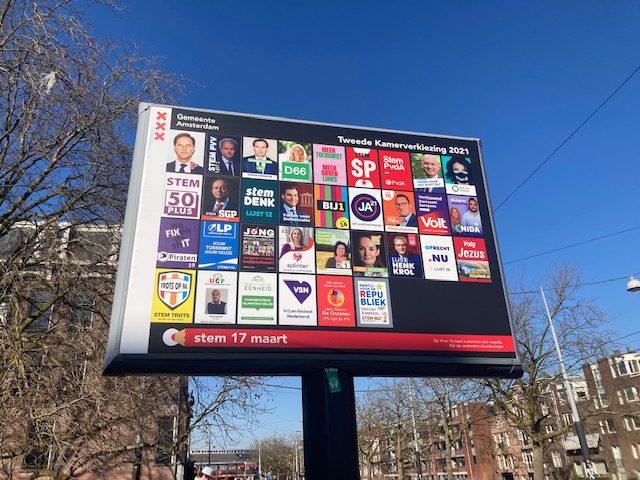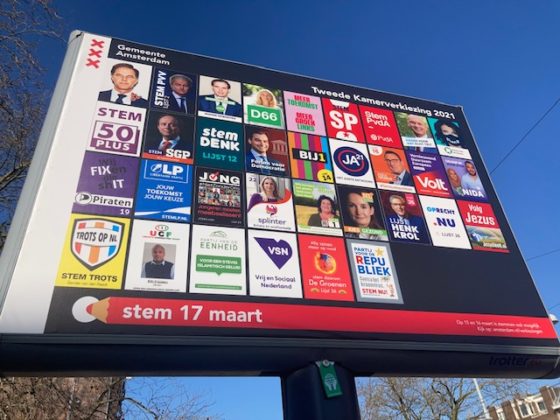Election interview: The Netherlands is creeping to the right


Dutch voters are currently heading to the polls to cast votes in an election they know will have little impact on the country’s political climate – if the opinion polls are to be believed.
For despite the turmoil of the pandemic, the curfew, the subsequent riots and a national benefits scandal that pushed the prime minister into resignation – the ruling VVD are almost certain to emerge as the biggest party, giving Mark Rutte his fourth term as prime minister.
After Rutte’s re-election, he will have to extensive negotiation and alliance building to drive policies forward. This process of continuous consensus building is seen as a mechanism of the nation’s inclusive, progressive social framework and as a bulwark against the dangerous forces of populism. Were a leader like Geert Wilders ever to win the popular vote, his agenda would be constrained in the same way, tied into a government grounded by coalition.
Extremist thinking
While the seemingly uneventful nature of a Dutch election can be construed as sign of good order and representation, a rise in far right and extremist thinking has come to dominate political discourse over the past several decades. Merijn Oudenampsen, a research fellow at the University of Amsterdam, has mapped this surge in his recent book The rise of the new Dutch right: An intellectual history of the rightward shift in Dutch politics.
In it, he observes how the Netherlands’ apolitical atmosphere fostered a sense of alienation and resentment, which rather than extinguishing history, reignited ideological conflict throughout the 1990s and 2000s. Despite the inevitable victory of Rutte’s centre right VVD party and its bland, business administration facade, this election may represent another creeping step in a rightward march long in the making.
At the core of this idea, Oudenampsen says, is that far right groups like Geert Wilder’s PVV were born within the mainstream. ‘It’s often said that right wing populism came first and then the mainstream parties started accommodating their discourse,’ he says. ‘My argument is that in the beginning it was the other way around. Not from the margins to the mainstream, as academics typically believe, but from the mainstream to the margins. Now, they continuously feed off of one another.’
The connection between conservative and radical right wing populist parties is so deeply entwined, he says, it is increasingly difficult to discern between them.
From neoliberalism to neoconservatism
During the 1980s, a neoliberal reformation in Anglo American politics was seen under the leaderships of Margaret Thatcher and Ronald Reagan, whereby government would intervene in economic affairs to promote free market values.
Austerity measures, slashing public service spending, deregulation of the financial sector and privatisation of national institutions were the era’s infamous hallmarks. In the Netherlands, however, these trends were less pronounced. This is because the 1980s government, a coalition of the Christian Democrats (CDA) and VVD, led by Ruud Lubbers, was more quietly implementing similar, though often more stringent reforms.
Avoiding the public confrontation seen in Thatcher’s Britain, where widespread strikes, protests and riots were raging, the Lubbers cabinet carefully pacified its opposition by presenting policy shifts as technocratic, pragmatic adjustments.
Polder model
While neoliberal economic reforms in the Netherlands were largely covert, hidden within the post political frame, they were also in many ways softer. The ‘polder model’ of consensus politics subdued many of the harsh free market turns seen in the UK and US, and the subsequent Lubbers cabinets pursued comparatively moderate stances. In particular, a lack of cultural conservativism – characteristic of their Anglo American counterparts – failed to fully materialise.
Neoconservatism failed to emerge in the 1980s Netherlands because of the lack of polarised politics typical of the US and UK. ‘We never truly had this conservative counter revolution or these so called ‘culture wars’, which raised conflict over issues like abortion and drugs. In our country, liberal values were so advanced that when the New Right began to rise in the 80s and 90s they had to accept our progressive political culture,’ says Oudenampsen.
When Pim Fortuyn, the iconic leader whose ascension and assassination defined the Dutch populist right in the new millennium, entered the mainstream political scene, he maneuvered these cultural foundations against a new enemy – Muslim immigrants. His thinking took profound inspiration from Samuel Huntington, who posited a new global ideological conflict between east and west – free thinking, secular liberal democracies in the West, against the backward theocratic powers of the East.
Muslims
‘What happened was that the right then started accepting gay rights and feminism, and then used it as a stick to beat Muslims with. Progressive elites are incapable of defending our culture, Fortuyn argued, and therefore we need a strong approach against immigration. Some call it the hipster right,’ Oudenampsen says.
While appropriating gay rights and feminism to cultivate opposition to immigration and bolster a feeling of exclusionary national identity is not unique, ‘the Netherlands is the iconic country for this,’ Oudenampsen maintains. ‘When Pim Fortuyn emerged and used the threat of Islamic ideas to promote anti-immigration reform, many progressive people agreed with his discourse. That overlap is still here. This form of exclusionary politics is very difficult to identify.’
Oudenampsen admits a failure too on the part of the left to properly tackle thorny issues relating to Islam and immigration stemming from the fear of being labeled racist. Criticism of religious ideas has often been conflated with bigotry against its adherents. ‘We need to be careful how we frame our criticism,’ he says.
The Trumpian turn
After Fortuyn’s murder by an animal rights activist in 2002, an explosion in solidarity with his party and its principles swept the country.
Geert Wilders, a VVD defector, absorbed Fortuyn’s momentum his PVV party, founded in 2006, began advocating iron fist policies against Dutch Muslim communities. Banning the Koran and closing every Mosque in the country was proposed, and over the subsequent decade, the PVV rose to become the second largest party in an ever more fragmented parliament.
The emergence of Thierry Baudet and his Forum voor Democratie (FvD) party brought a new alt-right angle to the right wing scene, the displacing traditional rhetoric of the New Right.
His spreading of conspiracy theories over the coronavirus and casting doubt over the legitimacy of the elections came ‘straight from the Trump playbook’, Oudenampsen says.
Nevertheless, support for far right parties has never been much above 20%, and this time round, the PVV, FvD, newcomer JA1 are likely to poll below that figure when their support is combined.
‘What is now changing is that Islam is no longer the main issue in this election. For the first time, this is no longer a key issue in the election debates,’ says Oudenampsen. ‘Coronavirus has displaced Islam in the election debates and it is still a key issue of national identity. This has made for a very different type of politics.’
Thank you for donating to DutchNews.nl.
We could not provide the Dutch News service, and keep it free of charge, without the generous support of our readers. Your donations allow us to report on issues you tell us matter, and provide you with a summary of the most important Dutch news each day.
Make a donation